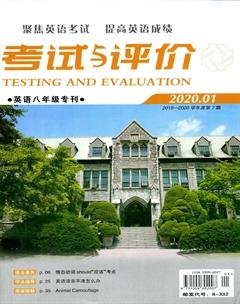反身代词用法考点探究
曲永华
反身代词:动作的承受者是动作执行者本身或强调动作所涉及的人称的代词,也就是表示“我自己、你自己、我们自己”等的代词。
名师点拨:
考点1. 可用作宾语,反身代词在句中作宾语,译为“……自己”,指的是宾语和主语表示同一个或同一些的人或事物。
He taught himself English. 他自学英语。
Maria bought herself a scarf. 玛丽亚给自己买了一条围巾。
We must look after ourselves very well. 我们必须好好照顾自己。
典型考例:
1. Dont worry, the girl is old enough to look after ______.
A. herself B. her C. hers D. she
思路点拨:
考查代词辨析。句意:别担心,这个女孩足够大了,能够照顾好她自己。the girl和后面的动词短语look after是动宾关系,即look after的宾语和the girl是同一个人。
答案:A
2. Teenagers should learn how to protect ______ (they) from all kinds of danger.
思路點拨:
考查反身代词的用法。句意:青少年应该学会如何在各种危险的状况下保护自己。所给词they与句中主语teenagers指的是同一些人,在句中作protect的宾语。
答案:themselves
3. Our teachers and parents will be proud of us because we have grown up and can be responsible for (对……负责) ______.
A. themselves B. ourselves
C. yourselves
思路点拨:
句意:我们的老师和家长会为我们感到骄傲,因为我们已经长大了,能够为自己负责。themselves“他们自己”;ourselves“我们自己”;yourselves“你(们)自己”。根据文中because we have grown up and can be responsible... 可知下文是说“我们自己”。
答案:B
4. —Jack, you swam very well. Who taught you?
—Nobody. I taught ______.
A. I B. me
C. myself D. mine
思路点拨:
句意:——杰克,你游得很好。谁教你的?——没有人。我自学的。I“我”,主格代词;me“我”,宾格代词;myself “我们自己”,反身代词;mine“我的”,名词性物主代词。结合语境可知,杰克是自学的游泳,因此teach后跟反身代词,teach oneself “自学”。
答案:C
5. Nobody taught the old lady how to use Wechat. She learned it all by ______.
A. she B. her
C. herself D. hers
思路点拨:
短语by oneself意为“独自;单独”。此处指这位老妇人自己学会使用了微信。
答案:C
考点2. 可用作表语,指的是表语和主语表示同一个或同一些人或事物。
The boy in the photo is myself, not Tom. 照片中的那个人是我自己,不是汤姆。
She isnt quite herself today. 她今天身体不太舒服。
考点3. 可用作主语或宾语的同位语,作同位语表强调,译为“亲自、本人”,常用来加强语气。
She herself will fly to London tomorrow. (主语同位语) 明天她自己将要坐飞机去伦敦。
I met the writer himself last week. (宾语同位语) 我上周见到了那位作家本人。
考点4. 用在某些固定短语当中。
look after oneself / take care of oneself 照顾自己
teach oneself sth. / learn sth. by oneself 自学
enjoy oneself 玩得高兴,过得愉快
help oneself to sth. 请自用……(随便吃/喝些……)
hurt oneself 摔伤自己
say to oneself 自言自语
leave sb. by oneself 把某人单独留下
buy oneself sth. 给自己买……
introduce oneself 介绍自己
by oneself 靠自己;
dress oneself 打扮;自己穿衣服
come to oneself 苏醒
易错知识警示:
1. 反身代词不能单独作主语,但可以作主语的同位语,起强调作用。
他自己能完成作业。
(误) Himself can finish his homework.
(正) He himself can finish his homework.
(正) He can finish his homework himself.
2. 反身代词表示“某人自己”,不能表示“某人的东西”,因为它没有所有格的形式。表达“某人自己的(东西)”时,需要用ones own。
我用我自己的蜡笔画画。
(误) Im drawing with myself crayons.
(正) Im drawing with my own crayons.
巧学妙记:
反身代词表自身,句中可作三成分
动介后面用作宾,表示动作回自身
句中强调同位语,主语宾语后边跟
系动词后作表语,这个用法要牢记。
【反身代词过关擂台赛】
一、单项选择。
1. Those girls enjoyed ______ in the party last night.
A. them B. they
C. themselves D. herself
2. Help ______ to some fish, children.
A. yourself B. your
C. yours D. yourselves
3. The film ______ is very fun.
A. its B. itself C. it D. its
4. —Who teaches ______ math?
—I teach ______.
A. your; myself B. you; myself
C. you; me D. you; herself
5. Luckily, he didnt hurt ______ terribly yesterday.
A. him B. themselves
C. himself D. they
二、用適当的反身代词填空。
1. Bad luck! I cut ______ with a knife yesterday.
2. They tell us they can look after ______ very well.
3. My cat can find food by ______.
4. Help ______ to some beef, boys.
5. Bill wants to teach ______ French from now on.

